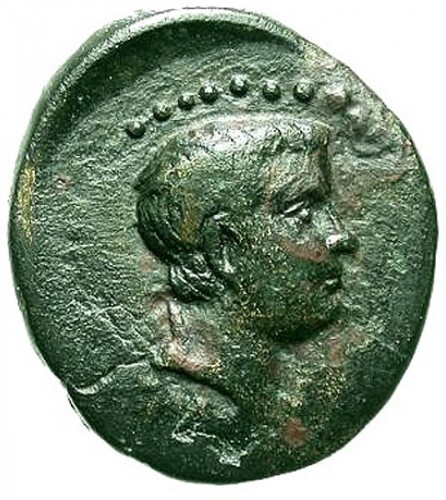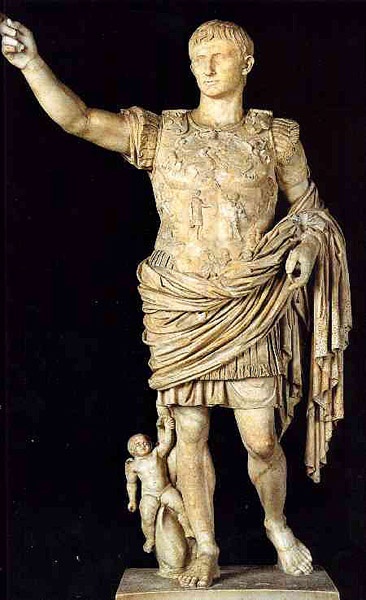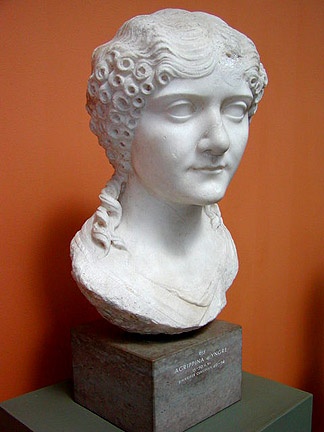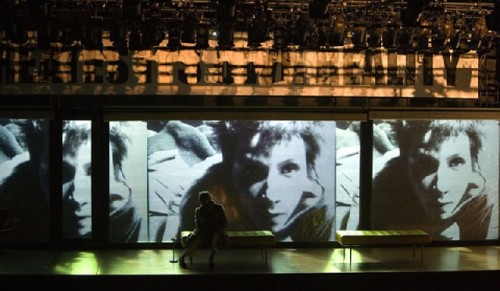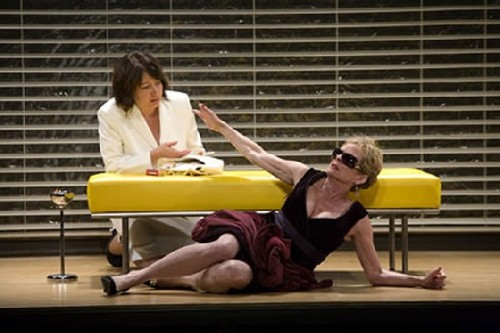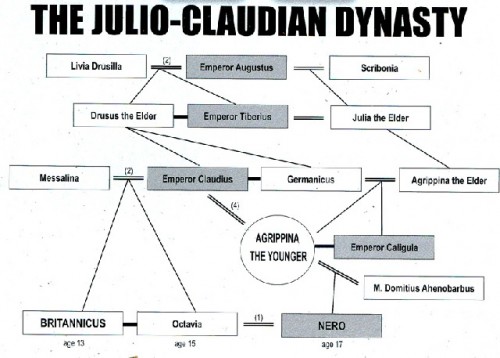Sun Sets on Britannicus
American Repertory Theatre Deconstructs Racine's Drama
By: Charles Giuliano - Jan 26, 2007
Britannicus
By Jean Racine with translation by C. H. Sisson
Director, Robert Woodruff, Scenic design, Ricardo Hernandez, Lighting design, Christopher Akerlind, Costume design, Kaye Voyce, Sound design, David Remedios, Video design, Leah Gelpe, Original music, Alfredo Narciso, Stage manager, Amy James, Voice and speech coach, Nancy Houfek, Casting, Judy Bowman. Cast: Nero, Alfredo Narciso, Britannicus, Kevin O'Donnell, Agrippina, Joan Macintosh, Junia, Merritt Janson, Burrhus, John Sierros, Narcissus, David Wilson Barnes, Albina, Adrianna Krstansky, Octavia, Megan Roth, Pallas, Douglas Cochrane. Running time approximately two hours with no intermission.
The American Repertory Theatre, 64 Brattle Street, Cambridge, Mass. 02138 January 20 through February 11. Box office: 617 547 8300 http://www.amrep.org
The history of Rome's Julio-Claudian dynasty as recorded by Tacitus and Suetonius is rich, dense, complex, horrific and daunting. It takes careful reading to follow the twists and turns of countless liaisons, lines of succession, intrigues, murders and betrayals. There is an overwhelming amount of back story to approach and comprehend first the original history, then how it was set in the theatre by Jean Racine during the French court of the Sun King with an unsuccessful premiere in 1669, and then to confront its radical, avant-garde, deconstruction as currently staged at the American Repertory Theatre under departing artistic director, Robert Woodruff.
While Britannicus, the disinherited son of the Emperor Claudius lends his name to the play he is really just the fulcrum or tipping point in a power struggle between Agrippina the Younger, the niece and fourth wife of Claudius, and her son, Nero, adopted by Claudius, whom she conspired to set on the throne. Because of the apparent betrayal and ingratitude of Nero to his mother she is now throwing her support to the true heir, Britannicus, and an engagement she has arranged with the last in the line of the Emperor Augustus, the Princess Junia.
It is Claudius and his decision to adopt Nero, Agrippina's only son by a prior marriage, that casts a long shadow over the events of this convoluted drama. Of all the smarmy house of the Julio-Claudians the bumbling, awkward but brilliant and poetic Claudius was the only one of the bad lot who had anything approaching redeeming social and humanistic values. Was he stupid and inept to allow himself to be manipulated by the evil and ambitious Agrippina who more than likely poisoned him once he adopted her son and set aside his natural heir? Or by choosing the elder of the two, both just boys at the time of his death, was Claudius shrewdly opting to avoid a war of succession and possible civil war that ultimately might destroy the Empire?
Once he caught on to the fatal intrigue of his loveless wife, had he lived longer giving Britannicus more years to mature, might he have reversed his decision and recovered support for his natural son? This was a risk Agrippina was unwilling to take. In her further plotting to make the claim of Nero more legitimate she arranged to have him marry Octavia, daughter of Claudius, and sister of Britannicus. But Nero having risen to emperor through intrigue realizes that there is always the threat of a mood swing of the Romans back to Britannicus particularly since Agrippina arranged for him to become engaged to Junia, last in the line of the beloved founder of the dynasty of Augustus. Toward that end Nero wants Junia for himself and threatens to murder him if she does not renounce her love for Britannicus. In Racine's most famous scene there is a poignant meeting of the lovers in which she must not flinch or betray true emotions in rejecting him while Nero listens in the shadows.
Clearly this is a lot of plot and back story to absorb and make sense of during the course of an intense staging of the drama in one act lasting two hours without a potty break. Particularly given Woodruff's harsh and mannered direction and the full bag of post modern tricks of the theatrical trade including transforming Nero the lyre strummer into a rock star of sorts, the amplification of the actors which makes all the more shrill and booming their shouting exchanges, and a stark set by Ricardo Hernandez, a triptych of sorts, which is curiously more modernist than post modernist. Much of staging is so wooden that at time the actors, particularly the Burrhus of John Sierros, and the Junia of Merritt Janson, resemble marble Roman statues with microphones.
What appears to have attracted first Racine, and now Woodruff, to this replay of Imperial Roman treachery and personal/ political intrigue is its resemblance to the political mood of the time from the absolute monarchy of Louis XIV and his abuses and those of our now wildly unpopular imperial president, George W. Bush. In the event that this not so subtle point is lost on us above the stark, minimalist set with its back lit video projections is a banner that proclaims "Empire Creates Its Own Reality." The liner notes for the play identify it as a paraphrase of a statement from the Bush court. It is a signifier of the jingoistic banner on the deck of the aircraft carrier on which Bush dramatically landed that tragically and prematurely proclaimed "Mission Accomplished." Yes, Mr. Woodruff, we get it. But with Bush's approval ratings now in the 20s, the lowest since just before Nixon resigned; do we really need to flog this beast or spank the monkey of absolute power corrupting absolutely?
It is said that Nero had redeeming qualities before his monstrous devolution. Curiously, historians argue that even Caligula was ok in the beginning. And following 9/11 the vast majority of Americans approved of the job being done by Bush. So history has its relevance but at ART, with a stacked house of Cambridge liberals, Woodruff is preaching to the converted which overall seemed to much enjoy the play, based on a standing ovation, and went home feeling good about themselves. So am I just a curmudgeon and nit picker for seeing the evening differently?
For openers, it would have been more interesting had Woodruff deconstructed the "Caligula" of the existentialist thinker Albert Camus. That is a far more interesting and challenging play covering much the same territory. One evil monstrous Roman Emperor, alas, is much like another. But Camus is far more successful in having us rethink and even sympathize with his character flaws and political conundrums. Perhaps the excellent, arguably wondrous, text of Racine is too embedded in the style of the 17th century to respond well to a post modern makeover in the 21st century. The result seems far too labored and with the exception of the excellent acting of Joan Macintosh as Agrippina it is all but impossible to absorb that dense and wordy text. Her Agrippina is the only performance that brings any subtle nuance to a character. Oddly she is the only character I understood and cared for. The other actors just lacked depth, craft, and life experience to flesh out their motivations. Or was this just a matter of the stark, limiting, mannerist direction of Woodruff which only Macintosh had the skill to wiggle out from.
How to deal with the clichés of the set by Riccardo Hernandez? He can be outrageously inventive as, for example, the lurching and rocking set for last year's wonderful production of "No Exit" by Sartre. But here he just appears to be self indulgent. This was Woodruff's last production for ART and perhaps Hernandez was just encouraged to pull out all the stops. After awhile, however, there gets to be a numbing sameness to post modern designs. In too many details this stage design resembled the season's earlier production of "Wings of Desire." Once again was have a largely bare stage with all of its guts and walls revealed. In the center of which is a "triptych." The center portion is a house or room, which curiously resembles the Barcelona Pavilion of Mies van de Rohe, or the Glass House of Phillip Johnson. The minimalist, brightly colored yellow couch, a slab, and the organic red arm chair seem so cool sixties. I kept looking to spot the lava lamp. On the wings of this folding altar piece, arguably the "Garden of Earthly Delights" by Bosch, are ersatz views of Heaven and Hell. These wings function as bed rooms. In the opening scene a biker enters stage right, strips and takes a shower with a few provocative glimpses of his ass. Later we get more erotic flashing when Agrippina enters the bedroom, removes her top. exposes an ample bosom to Nero, unseen by us as her back is to the audience, and lays down to bed with him. Oh my. Incest, which is de rigueur for a Roman drama. What's the fun without some kinky sex?
In the final scene of the play stage hands come and dismantle the "house" pushing it aside to show the bare stage and a banquet table at which Nero will poison Britannicus. The action seemed far too removed and was not visually engaging. Again Woodruff used the devise of a video camera, employed by Nero, and large live projections as a signifier of the emperor as voyeur for bit of Orwellian "Big Brother is Watching." By that point in the evening why not just pile on the clichés? It is surprising that the director refrained from a replay of Bush's recent State of the Union speech.
So did I go home whistling the merry tunes aptly performed by Alfred Narciso who may be a better musician than actor? Arguably he has more talent than the pretentious "artist" Nero who was scandalously bad when he performed in Greece. But I am sure the audience applauded just as they did for this ART production. Overall it felt like I had gotten a good history lesson rather than an enriching experience of contemporary theatre. Perhaps I had been expecting a toga party. Oh well.

